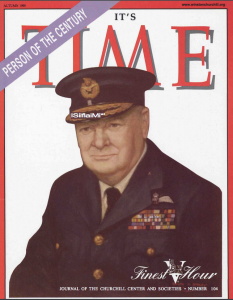
Desert Island Books: Charles Krauthammer’s “Things that Matter”
Charles Krauthammer’s Things That Matter: Three Decades of Passions, Pastimes and Politics (388 pages, Crown Forum, 2013). In remembering Dr. Krauthammer, I said this book was one of a score I’d take with me if confined to a desert island. Here’s why.
The reader will ask: why am I plugging to a Churchill audience a set of essays by a political columnist? Answer: because many are not political, yet reflect Churchillian thought. Moreover, Dr. Krauthammer’s essay about Churchill is one of the best summaries of the man I’ve ever read. By anybody. Anywhere.
Significantly, in a book of over nearly ninety columns and essays, the Churchill article ranks second—in Part I (entitled “Personal”)—after a piece on the author’s beloved brother, Marcel, who also died young after an heroic struggle. Churchill was a very personal topic of Charles Krauthammer’s. He frequently quoted Sir Winston, always accurately.
Krauthammer’s Slant
Meg Greenfield, longtime editorial page editor of The Washington Post, called the Krauthammer’s column “independent and hard to peg politically. It’s a very tough column. There’s no ‘trendy’ in it. You never know what is going to happen next.” This reminds me of Churchill. So much does. They both “crossed the aisle.” Dr. Krauthammer was once Walter Mondale’s speechwriter. Churchill ended up a Tory, “CK” a conservative. Yet it’s risky to label either of them. Perhaps we might better define them both as classical liberals.
Krauthammer’s words make everyone listen, and sometimes reconsider. For instance, he recently convinced me to abandon tradition and support a name change for the Washington Redskins: “It is simple decency to stop using a slur.” Like me, he rooted for underdogs. We were baseball fanatics who back the Washington Nationals. Being Nationals fans is no easy task. If you want easy, root for the Yankees.
Of course if you’re going to read Krauthammer’s columns, it helps if you agree with him. (Whenever I don’t have an answer to some current question I say that I have to read him first so I’ll know what to think.) But look: I have very liberal friends who also read and admire him. His death occasioned statements of respect from all areas of opinion, except the fever swamps. Don’t succumb to labels. He had his heroes, left and right. Buy the book to enjoy elegant writing, the precise layering of facts and logic, by a deeply caring man who applied serious brainpower to contemplating everything from “Borat” to the Cosmos.
Churchillian Parallels
But why spend money on a 388-page book less than 1% of which is specifically Churchill? Because there’s a lot of other material that touches his saga: the Middle East, wars in Asia, bioethics, serious enquiries into the nature of man and the universe. (Churchill covered that in Thoughts and Adventures.)
Churchill-related columns include insults (“In Defense of the F-Word”), the “Joy of Losing” (something Sir Winston knew about), how to define democracy (Churchill laid out precepts, Krauthammer laid out Albania), the Holocaust, Zionism, Language, Leadership, the question of Germany’s “collective guilt.” There’s plenty here to interest Churchillians.
* * *
“Things That Matter”—to the author as to Churchill—include: “the innocence of dogs, the cunning of cats, the elegance of nature, the wonders of space…the difference between historical guilt and historical responsibility, fashions and follies…manners and habits, curiosities and conundrums social and ethical. Is a doctor ever permitted to kill a patient wishing to die? Why in the age of feminism do we still use the phrase ‘women and children’?”
Churchill read H.G. Wells and wrote a piece asking, “Are There Men on the Moon?” Krauthammer studied Fermi and wondered: “With so many habitable planets out there, why in God’s name have we never heard a word from a single one of them?” Fermi’s answer, as CK explained, is disquieting. These are subjects, in Krauthammer’s words, that “fill my days, some trouble my nights.”
Unlike many pundits, Dr. Krauthammer laughed at himself and cultivated a sense of humor. He read Stephen Hawking’s A Brief History of Time “as a public service—to reassure my readers that this most unread bestseller is indeed as inscrutable as they thought.” Speaking of the attempts to contact alien life forms (Voyagers 1 and 2), he mentions that the greetings they carry, on behalf of all mankind, are from the UN Secretary-General Kurt Waldheim, a Nazi. “Makes you wish that we’d immediately sent out a Voyager 3 beeping frantically: Please disregard all previous messages.”
Indispensable Man

Do you to know what CK wrote about Winston Churchill? He spoke of him frequently on the air, but this essay is from the run-up to Time magazine’s “Person of the Century” sweepstakes in 1999. I’ve quoted it so often that I’ve almost memorized it. In Krauthammer’s view, Churchill was the only possible Person of the 20th Century. Einstein (Time’s pick) was “the best mind” of the century, true. But if he hadn’t invented all those theories, somebody else would have. Churchill, on the other hand, was indispensable. CK wrote:
* * *
Take away Churchill in 1940…and Britain would have settled with Hitler—or worse. Nazism would have prevailed. Hitler would have achieved what no other tyrant, not even Napoleon, had ever achieved: mastery of Europe. Civilization would have descended into a darkness the likes of which it had never known.”
In essence, the rap on Churchill is that he was a 19th century man parachuted into the 20th. But is that not precisely to the point? It took a 19th century man—traditional in habit, rational in thought, conservative in temper—to save the 20th century from itself…. The originality of the 20th surely lay in its politics. It invented the police state and the command economy, mass mobilization and mass propaganda, mechanized murder and routinized terror—a breathtaking catalog of political creativity.
And the 20th is a single story because history saw fit to lodge the entire episode in a single century. Totalitarianism turned out to be a cul-de-sac. It came and went. It has a beginning and an end, 1917 and 1991, a run of 75 years neatly nestled into this century. That is our story.
* * *
I’m not going to spoil it by leaking any more. Here is the keynote: it comes at the end. We are asked: who are the heroes of the last century? “Who slew the dragon?” CK provides a list, from the Greatest Generation to FDR, de Gaulle, Truman, John Paul, Reagan…. “But above all victory required one man without whom the fight would have been lost at the beginning. It required Winston Churchill.”
One more, very Churchillian thing: there’s no self-absorption here. Churchill was thrown out in 1915 and 1945. He simply ignored it, rebuilt his life and career. A third of the way into Krauthammer’s life, young Charles dove into a swimming pool and banged his head. He spent the last forty-four years of his life in a wheelchair. He also became a psychiatrist, a syndicated columnist, a writer, a husband and father, a TV personality, a Pulitzer Prize winner. Now that’s a Churchilllian performance.
________
This review is updated from the original in The Churchillian, a publication of the Winston Churchill Memorial and Library, Fulton, Missouri, Winter 2013. To hear Dr. Krauthammer himself on his book at Politics and Prose Bookshop, click here.






